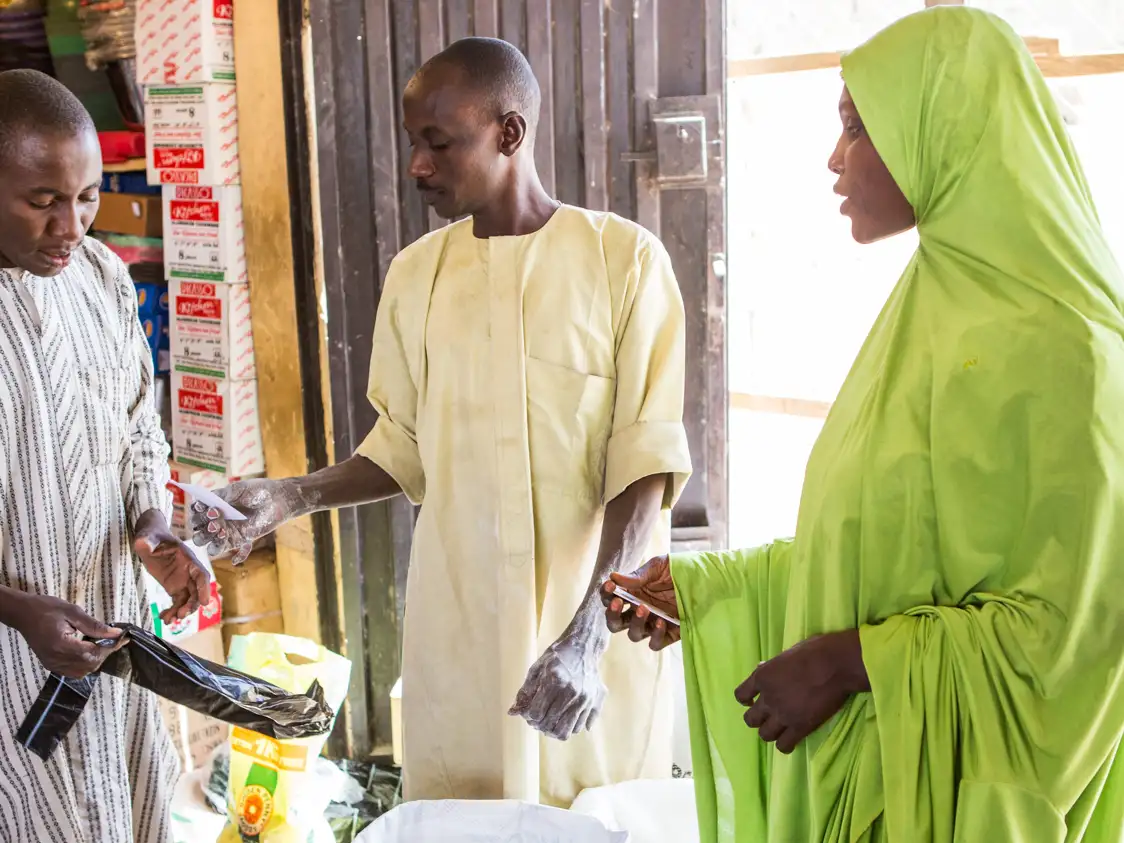

Zaniab in north east Nigeria, had to flee with her children when Boko Haram attacked her village. She receives food for her family via an e- voucher card scheme run by CAFOD’s sister agency CRS and supported by EU Humanitarian Aid
What is happening in the Lake Chad basin - Niger, Chad and Cameroon?
Eight years ago, a violent conflict began in north east of Nigeria. Over the last four years this has worsened as Boko Haram, a Nigerian militant Islamist group, has spread its violence into the neighbouring countries of Niger, Chad and Cameroon.
Help CAFOD respond to emergencies by making a regular gift
What are the needs?
The United Nations estimates that 17 million people in Nigeria, Niger, Cameroon and Chad are in need of emergency aid. People are facing famine-like conditions because they have been forced to abandon their crops as they flee Boko Haram.
The humanitarian needs are great, with people in urgent need of food, water, sanitation, healthcare and shelter.
Bishop Oliver Dashe Doeme of the Diocese of Maiduguri, north east Nigeria, told us:
“Boko Haram have swept our communities of anything that belonged to our people. Their animals have gone, their crops have gone, their houses have been destroyed, their vehicles have gone. It is a very, very serious situation.”
What has been the response from the international community?
In February, last year, the international community held a donors meeting in Oslo, Norway, to discuss how to address this crisis. CAFOD along with other Caritas and International aid agencies, called for a seven-step plan to respond to the crisis. They also looked at the longer-term needs, in order to save more lives and help vulnerable people across the Lake Chad Basin region. The seven step plan seeks to:
Put protection of civilians at the centre of the humanitarian response
Scale-up the food and nutrition response in Nigeria and the region
Increase access to more, better and safe quality education
Safeguard humanitarian space: safe movement to reach more people in need
Strengthen leadership of the response and improve humanitarian coordination
Ensure all returns are safe, voluntary and dignified
Build resilience and increase local capacity
Help us respond when emergencies happen by making a regular gift
What is the situation in north east Nigeria?
The scale of the crisis in north east Nigeria is widespread, exceeded only by emergencies in Syria, South Sudan and Yemen.
Over 1.4 million people are displaced in north-east Nigeria. In the three most affected states of Borno, Adamawa and Yobe, almost 7 million people are in need of humanitarian assistance, more than 50 per cent of whom are children.
In newly accessible areas, vulnerable host communities are also in critical need of humanitarian aid - including food, water, sanitation, protection, education, shelter and health services.
Some families are living in the relative safety of urban centres, however, the situation is dire, as families face already overcrowded living conditions.
Maiduguri, the capital of Borno state, and Greater Maiduguri (including Jere) have seen their population double from one to two million with the influx of people fleeing the violence in other areas of the state.
Our Senior Emergency Officer, Laura Pruves, who has visited Maiduguri, to support the humanitarian response said:
"Violence continues to disrupt people’s lives, preventing farmers from planting and others from earning a living. The situation is a ‘silent emergency’, where it is predicted that without continued humanitarian assistance, millions more vulnerable people face the prospect of not having enough food to eat."
How is CAFOD responding in north east Nigeria ?
We are responding to the crisis with the support of our sister agency CRS, who have been on the ground since 2014, reaching displaced communities with emergency aid. With funding from EU Humanitarian Aid - (European Civil Protection and Humanitarian Aid Operations), together, we are working to reach more than 12,000 vulnerable families with emergency food, nutrition and nutritional screening. We are also using technology - e-vouchers or food credit cards, which allows families to buy the food they need, when they need it, in the local market place, from an trusted vendor without the need for cash.
What is the situation in Niger?
Caritas Niger (CADEV), has been working with families who have fled violence and have little or no access to food and shelter. They have also been working with Caritas organisations in neighbouring Mali and Burkina Faso, supporting refugees and internally displaced people following the conflict in Mali in 2012.
How is CAFOD responding in Niger
15,000 people have been reached with basic emergency aid; cash for food, hygiene kits, mosquito nets and water conservation equipment.
CADEV continues to work to combat malnutrition, by providing health care for pregnant and breast-feeding mothers;and training for health workers and mothers with malnourished children, in how to cook nutritious rich food. They are also working to ensure children are vaccinated.
We have been working with CADEV since 2005.
Help us respond when emergencies happen by making a regular gift
CAFOD’s partners in north east Nigeria and Niger
We are working with the Caritas Internationalis network in north-east Nigeria and Niger. In Borno state, north east Nigeria, we are working with sister agency CRS and with Caritas Nigeria, and in Niger we are working with Caritas Niger (CADEV).

